 A nursing home is both health care facility and a home to many elderly individuals. The elderly must depend on a diverse group of individuals to maintain a quality of life, from caregivers who make sure elderly tenants are fed and clean, to health care providers and activity teams who ensure healthy living in body and mind.
A nursing home is both health care facility and a home to many elderly individuals. The elderly must depend on a diverse group of individuals to maintain a quality of life, from caregivers who make sure elderly tenants are fed and clean, to health care providers and activity teams who ensure healthy living in body and mind.
Improving the quality of care for individuals who will live in a nursing home that needs better quality care can be a difficult task. But it doesn't have to be daunting. In fact, the Centers for Medicare & Medicaid Services (CMS) instigated a national Nursing Home Quality Initiative in 2002. This initiative is designed to collect data on assessing nursing homes and residents' physical and clinical conditions, as well as residents and families' preferences, and overall nursing home satisfaction.
The data helps to develop quality measures for nursing homes to provide top quality care as well as give residents and their families' information that shows how well their nursing homes are providing for the physical, psychological and clinical needs of residents.
Preventative Care
One caveat to improving health care in nursing homes is the difficulty of strategizing preventative care to frail residents. Providing a systematic screening and health maintenance is one method that quality nursing homes utilize, including systematic weighing and nutritional assessments of residents.
Improving quality of nursing homes includes looking at relevant goals of prevention, including:
- Ensuring the elderly are not isolating but active in activity and social support program(s)
- Prevention of illnesses that crop up as a result of treatment, such as reaction to drugs.
- Prolonging effective activities and functions.
- Combining standard institutional efforts with individual needs, such as reducing accidental injury in fall prevention programs by identifying individual disorders and weakness in balance, muscles, coordination, adverse drug side effects, etc.
High Nursing Staff Levels
Medicare and Medicaid researchers have found a direct correlation between nurse staffing levels and nursing home "deficiency scores", which can result from poor results from annual inspections that include violations of federal safety regulations for quality of care, physical environment and basic human rights. All topics that would be covered in the online RN-BSN programs for the future nurses these facilities need.
In fact, researchers found that nursing homes that provide more nursing assistant care people per residents per day had the lowest deficiency score rates. For example, in facilities with fewer certified nursing assistants per resident per day for just one hour scored a 30 percent increase in quality-of-care deficiencies.
Many families wrestling with the often emotional and complex task of seeking nursing home care for their loved ones often turn to the Nursing Home Compare Web site. The web site provides information on nursing homes that hire more nursing staff, thereby lowering their deficiency scores and improving quality of care.
Evaluating nutritional status and iatrogenic issues
Many nursing homes utilize an active program that evaluates residents' nutritional status and identifies weight loss and adult failure-to-thrive syndrome, which is basically defined by unintentional weight loss. Keeping a close eye on high-risk individuals and implementing support involving family, nursing staff, dieticians, and other staff is proven to improve nutritional status and prevent disability.
Prevention of iatrogenic issues from drug to drug interactions is also an area of great potential in the nursing home. Many nursing home residents take an average of eight high-risk medications including diuretics and particular psychoactive drugs that may interact adversely. Improving communications between doctors and nursing homes as well as increasing the number of nursing assistants in nursing homes can provide important information on baseline functioning and symptoms with ongoing drug treatments.
Importance of activity programs
Finally, nursing homes that do not provide enough activity programs can be detrimental to the overall psychological well-being of residents. Nursing home activities play an integral part of a person-centered nursing home. Activities are essential for the quality of life for all residents. Nursing home activities are also governed by particular federal regulations. Quality nursing homes provide a wide range of activities from yoga to entertainment, scenic drives, even physical therapists who work to provide safe and effective aerobic, water aerobic and strengthening exercises.
For more information on finding a quality nursing home, check out Medicare's guide to choosing a nursing home which includes steps to finding a nursing home in your area.







